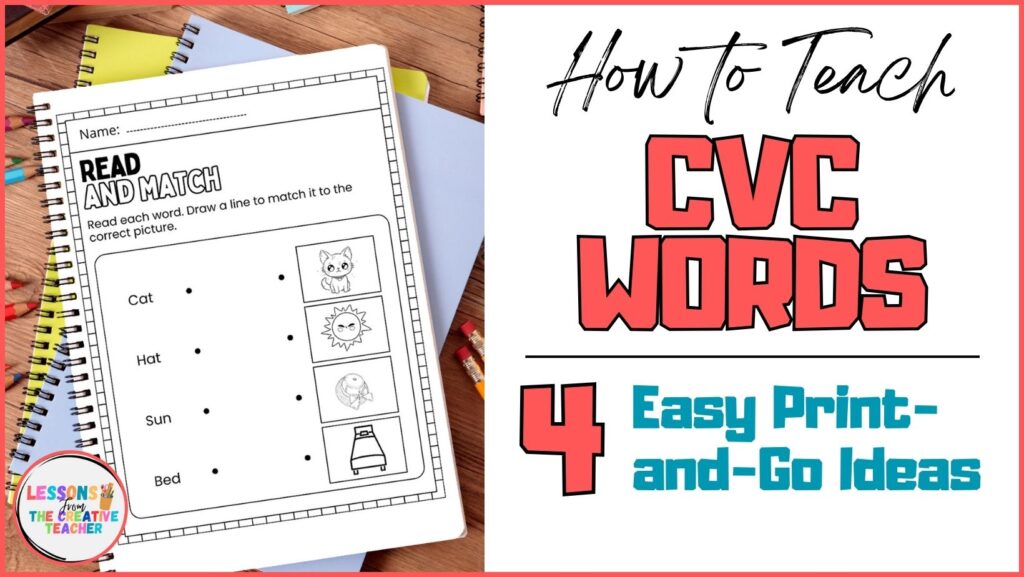How to Teach CVC Words: 4 Easy Print-and-Go Ideas
CVC words (consonant-vowel-consonant) are one of the first steps young readers take on their journey to becoming confident readers. Teaching cvc words doesn’t have to be hard! With fun, hands-on activities and a little consistency, kids can learn to sound out and recognize these short words quickly. Whether you’re a parent or a teacher, this post will walk you through four easy print-and-go ideas that make teaching cvc words simple and fun.
Why CVC Words Matter in Early Reading
CVC words are three-letter words made up of a consonant, a vowel, and another consonant—like “cat,” “bed,” or “sun.” These simple words are perfect for early readers because they follow predictable patterns and help children understand the relationship between letters and sounds.
Mastering cvc words is important because it helps:
- Build early decoding skills
- Strengthen phonemic awareness
- Lay the foundation for reading fluency and spelling
Most students start learning cvc words in Kindergarten or early 1st grade, once they recognize individual letter sounds and are ready to blend them into words. Learning to read cvc words gives kids a big confidence boost—they can finally read real words!
4 Easy Print-and-Go CVC Word Activities
Teaching cvc words doesn’t require fancy tools or long prep time. These four activities are ready to print and use immediately. Each one supports essential phonics skills in a playful, low-stress way.
1. Read and Match (Word to Picture)
In this activity, students read a list of simple cvc words (like “dog,” “pen,” or “hat”) and draw a line to match each word to the correct picture.

Why it works:
- Helps students practice decoding and word recognition
- Connects reading to visuals, making words more meaningful
Try this: Use it during literacy centers, small group instruction, or even one-on-one practice.
2. Fill in the Missing Letter
This worksheet features cvc words with a missing beginning, middle, or ending letter. Kids have to listen to the sounds and write the correct letter to complete the word.

Why it works:
- Reinforces phonics awareness and sound-letter correspondence
- Encourages listening closely to each sound in a word
Tip: Let kids use letter tiles or stamps to make it more interactive.
3. Word Scramble
Students are given scrambled letters like “tac” or “gdo” and asked to unscramble them to form a correct cvc word.

Why it works:
- Builds problem-solving skills and spelling confidence
- Strengthens blending and letter sequencing
Classroom idea: Make it a timed challenge or small-group competition to boost engagement.
4. Write the Word
This simple but powerful activity has students look at a picture (like a map or a pig) and write the matching cvc word underneath.

Why it works:
- Encourages encoding skills (turning sounds into words)
- Reinforces vocabulary and letter formation
Pro Tip: Use this for morning work or as a quiet activity after lunch or recess.
Grab Your FREE First Grade CVC Words Worksheet Pack!
Want these activities in a ready-to-use printable format? Our FREE First Grade CVC Words Pack includes all four activities:
- Read and Match
- Fill in the Missing Letter
- Word Scramble
- ✍️ Write the Word
These no-prep worksheets are perfect for:
- Homework
- Small group work
- Independent centers
- Intervention time
Just print and go!
Click below to download your free CVC words worksheet pack:
Download the FREE Worksheet Pack
Tips for Teaching CVC Words in the Classroom or at Home
Whether you’re a teacher or parent, here are a few simple tips that make teaching cvc words easier and more effective:
- Practice a little every day – 5-10 minutes daily works better than one long session
- Use visuals – Add pictures to help kids make connections
- Incorporate games – Play oral blending games like “I say /c/ /a/ /t/, what’s the word?”
- Celebrate small wins – Clap, cheer, and show excitement when they read or spell a word correctly
Make it fun, and they’ll want to keep going!
Final Thoughts: Make CVC Words Fun and Effective
CVC words are the building blocks of early reading. They teach kids how to blend, spell, and recognize words—all essential for growing readers.
With these 4 simple activities, you can give your students the tools they need to become confident, successful readers. Best of all, they’re low-prep and ready to use!


